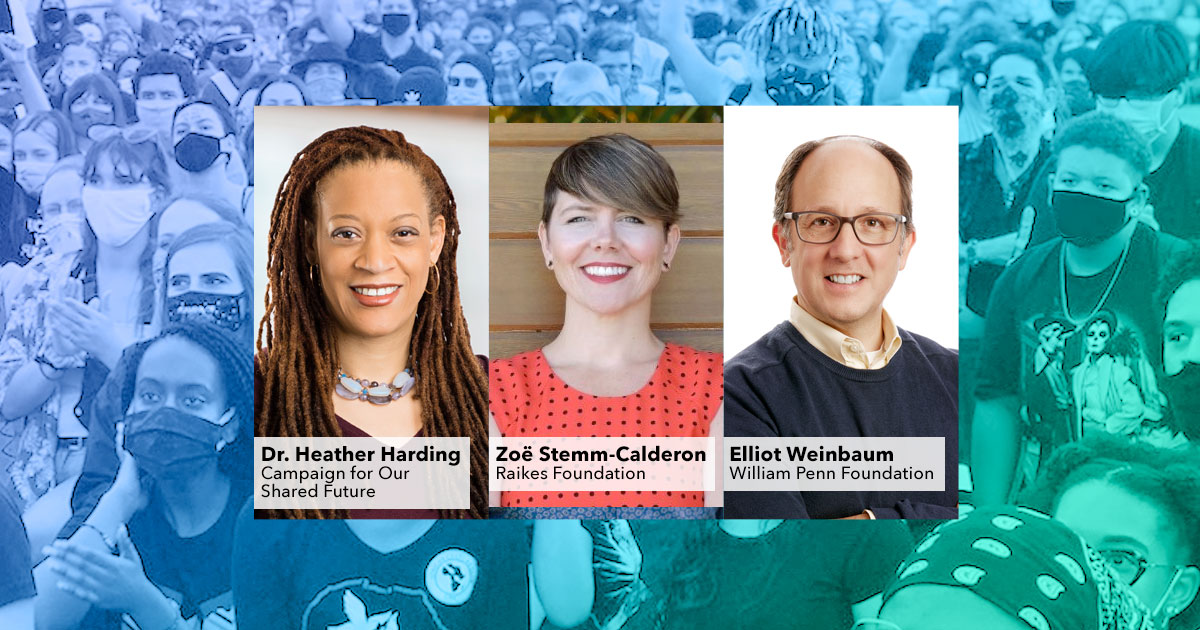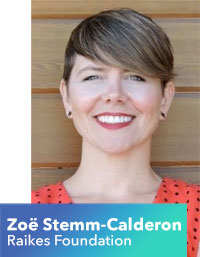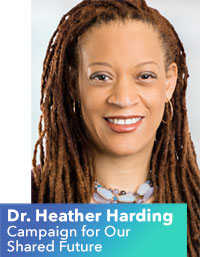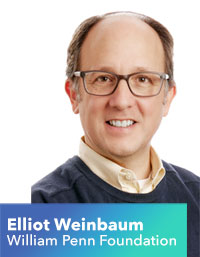 The Philos Interview: How Should Philanthropy Think About Risk? Contributors: Dr. Heather Harding is Executive Director of the Campaign for Our Shared Future, Zoë Stemm-Calderon is Senior Director of Youth Serving Systems at the Raikes Foundation, and Elliot Weinbaum is Chief Philanthropy Officer at the William Penn Foundation. Schott: There can be an institutional aversion to trying new strategies and tactics in philanthropy, even when there are significant changes on the ground. How should we think about risk in the philanthropic sector, and make our institutions nimbler?  Zoë Stemm-Calderon: The world is rapidly changing, especially for young people. Our education system, our political context, our social one, they’re all shifting and it is imperative that we as professionals also transform with them. We should lean into the literal meaning of philanthropy—“love of humanity”—as our starting place. But from there we must also recognize that we are all a product of our own experience. We've got to have stronger, deeper, and more resonant experiences with the problems we're seeking to solve, to understand the systems we're trying to change, and to be strong supporters of the proximate leaders who are trying to make that change. Zoë Stemm-Calderon: The world is rapidly changing, especially for young people. Our education system, our political context, our social one, they’re all shifting and it is imperative that we as professionals also transform with them. We should lean into the literal meaning of philanthropy—“love of humanity”—as our starting place. But from there we must also recognize that we are all a product of our own experience. We've got to have stronger, deeper, and more resonant experiences with the problems we're seeking to solve, to understand the systems we're trying to change, and to be strong supporters of the proximate leaders who are trying to make that change.
We should start from the assumption that facilitating our organization’s learning journey is required to have the impact we seek, rather than feeling frustrated about it. If the decision makers on our board don't understand a particular issue just yet, we have to keep working at it. We’ve got to roll up our sleeves and make the case; that's what we get paid for, in my opinion. If you don't want to be the one who makes the case for the stakeholders at your organization, that's okay. There are people who are amazing advocates, who maybe don't want to lead in philanthropy because they don't want to do that case-making. Still, I think many more of us could be taking our own risks internally at our organizations so we can support taking big risks out in the world.   Dr. Heather Harding: I was in philanthropy for about nine years. This is a little bit controversial, but I think that philanthropy as a sector has fallen for a narrative around measurement and impact in an unhealthy way. And one of the things that I think is so important, for example with the MacKenzie Scott gifts, is there's no pretense that what we do is the driver of impact on the ground: what we do is give money to people who drive the impact on the ground. And so in some ways, what the measurement really should be is how much money we get out the door. So I want to start there. Dr. Heather Harding: I was in philanthropy for about nine years. This is a little bit controversial, but I think that philanthropy as a sector has fallen for a narrative around measurement and impact in an unhealthy way. And one of the things that I think is so important, for example with the MacKenzie Scott gifts, is there's no pretense that what we do is the driver of impact on the ground: what we do is give money to people who drive the impact on the ground. And so in some ways, what the measurement really should be is how much money we get out the door. So I want to start there.
I think we have been risk-averse in educational philanthropy because we first want to do a service. In education in particular, there's a tension between providing direct service to students versus the kind of advocacy policy and the ecosystem in which schools operate.
It's very challenging to measure advocacy if you're looking for impact because policy is sausage-making. It’s hard to see which piece made the actual difference. One of the things I learned to look for was building capacity. When there are opportunities to see sustainability and a set of issues that were important issues, like funding for professional development and learning, do we think that's important as a public investment? Are people talking about the quality of teaching and instruction? Are people continuing to focus on how well-prepared teachers are? If you can measure the consistency of how important those issues are in the public debate, I think that's a good place to start.   Elliot Weinbaum: If the risk is shared with other investors, it’s lower because there are other people who have money in that effort. If your plan doesn't come to fruition in the way you hoped, your relative contribution has been smaller than if you had funded the effort in its entirety. So I think that’s why funders, when exploring whether to join an effort, are looking at what other funding is going toward it. Elliot Weinbaum: If the risk is shared with other investors, it’s lower because there are other people who have money in that effort. If your plan doesn't come to fruition in the way you hoped, your relative contribution has been smaller than if you had funded the effort in its entirety. So I think that’s why funders, when exploring whether to join an effort, are looking at what other funding is going toward it.
I think we as funders are, sometimes, willing to risk large amounts of capital on things we think are extremely important: if we're able to find co-investors in that effort, we’re happy to do so both to limit the risk on the part of the foundation, but also to increase the amount of resources that might be available to support that cause. For example, with the school funding lawsuit in Pennsylvania, the foundation saw a significant injustice in the system and as a result has made a wide range of investments to address it — litigation being one of them.  |